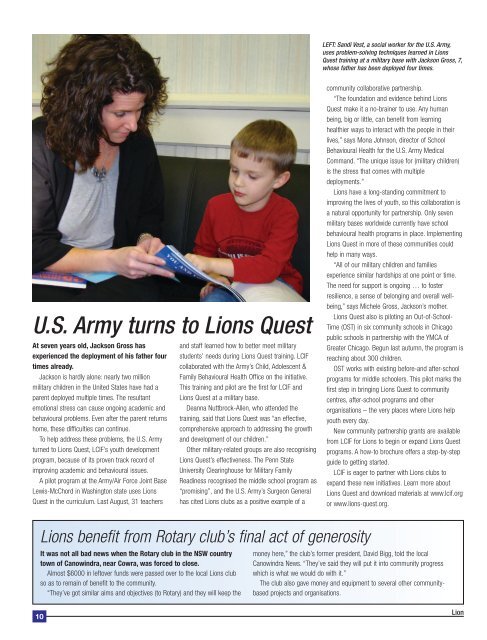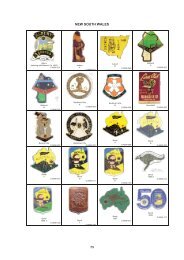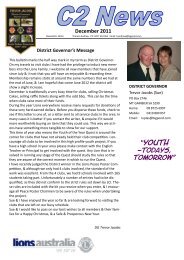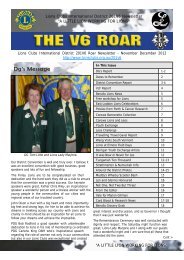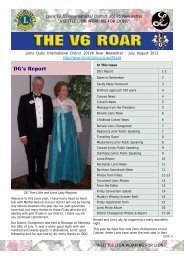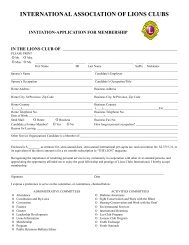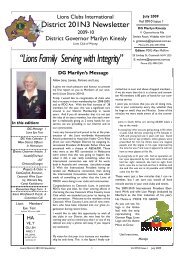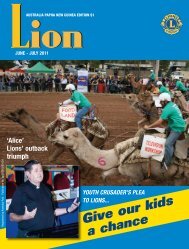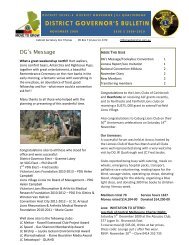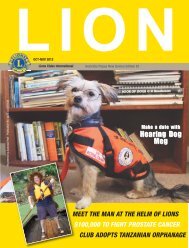2012 Feb - Lions Australia
2012 Feb - Lions Australia
2012 Feb - Lions Australia
You also want an ePaper? Increase the reach of your titles
YUMPU automatically turns print PDFs into web optimized ePapers that Google loves.
U.S. Army turns to <strong>Lions</strong> Quest<br />
At seven years old, Jackson Gross has<br />
experienced the deployment of his father four<br />
times already.<br />
Jackson is hardly alone: nearly two million<br />
military children in the United States have had a<br />
parent deployed multiple times. The resultant<br />
emotional stress can cause ongoing academic and<br />
behavioural problems. Even after the parent returns<br />
home, these difficulties can continue.<br />
To help address these problems, the U.S. Army<br />
turned to <strong>Lions</strong> Quest, LCIF’s youth development<br />
program, because of its proven track record of<br />
improving academic and behavioural issues.<br />
A pilot program at the Army/Air Force Joint Base<br />
Lewis-McChord in Washington state uses <strong>Lions</strong><br />
Quest in the curriculum. Last August, 31 teachers<br />
10<br />
and staff learned how to better meet military<br />
students’ needs during <strong>Lions</strong> Quest training. LCIF<br />
collaborated with the Army’s Child, Adolescent &<br />
Family Behavioural Health Office on the initiative.<br />
This training and pilot are the first for LCIF and<br />
<strong>Lions</strong> Quest at a military base.<br />
Deanna Nuttbrock-Allen, who attended the<br />
training, said that <strong>Lions</strong> Quest was “an effective,<br />
comprehensive approach to addressing the growth<br />
and development of our children.”<br />
Other military-related groups are also recognising<br />
<strong>Lions</strong> Quest’s effectiveness. The Penn State<br />
University Clearinghouse for Military Family<br />
Readiness recognised the middle school program as<br />
“promising”, and the U.S. Army’s Surgeon General<br />
has cited <strong>Lions</strong> clubs as a positive example of a<br />
<strong>Lions</strong> benefit from Rotary club’s final act of generosity<br />
It was not all bad news when the Rotary club in the NSW country<br />
town of Canowindra, near Cowra, was forced to close.<br />
Almost $6000 in leftover funds were passed over to the local <strong>Lions</strong> club<br />
so as to remain of benefit to the community.<br />
“They’ve got similar aims and objectives (to Rotary) and they will keep the<br />
LEFT: Sandi Vest, a social worker for the U.S. Army,<br />
uses problem-solving techniques learned in <strong>Lions</strong><br />
Quest training at a military base with Jackson Gross, 7,<br />
whose father has been deployed four times.<br />
community collaborative partnership.<br />
“The foundation and evidence behind <strong>Lions</strong><br />
Quest make it a no-brainer to use. Any human<br />
being, big or little, can benefit from learning<br />
healthier ways to interact with the people in their<br />
lives,” says Mona Johnson, director of School<br />
Behavioural Health for the U.S. Army Medical<br />
Command. “The unique issue for (military children)<br />
is the stress that comes with multiple<br />
deployments.”<br />
<strong>Lions</strong> have a long-standing commitment to<br />
improving the lives of youth, so this collaboration is<br />
a natural opportunity for partnership. Only seven<br />
military bases worldwide currently have school<br />
behavioural health programs in place. Implementing<br />
<strong>Lions</strong> Quest in more of these communities could<br />
help in many ways.<br />
“All of our military children and families<br />
experience similar hardships at one point or time.<br />
The need for support is ongoing … to foster<br />
resilience, a sense of belonging and overall wellbeing,”<br />
says Michele Gross, Jackson’s mother.<br />
<strong>Lions</strong> Quest also is piloting an Out-of-School-<br />
Time (OST) in six community schools in Chicago<br />
public schools in partnership with the YMCA of<br />
Greater Chicago. Begun last autumn, the program is<br />
reaching about 300 children.<br />
OST works with existing before-and after-school<br />
programs for middle schoolers. This pilot marks the<br />
first step in bringing <strong>Lions</strong> Quest to community<br />
centres, after-school programs and other<br />
organisations – the very places where <strong>Lions</strong> help<br />
youth every day.<br />
New community partnership grants are available<br />
from LCIF for <strong>Lions</strong> to begin or expand <strong>Lions</strong> Quest<br />
programs. A how-to brochure offers a step-by-step<br />
guide to getting started.<br />
LCIF is eager to partner with <strong>Lions</strong> clubs to<br />
expand these new initiatives. Learn more about<br />
<strong>Lions</strong> Quest and download materials at www.lcif.org<br />
or www.lions-quest.org.<br />
money here,” the club’s former president, David Bigg, told the local<br />
Canowindra News. “They’ve said they will put it into community progress<br />
which is what we would do with it.”<br />
The club also gave money and equipment to several other communitybased<br />
projects and organisations.<br />
Lion


